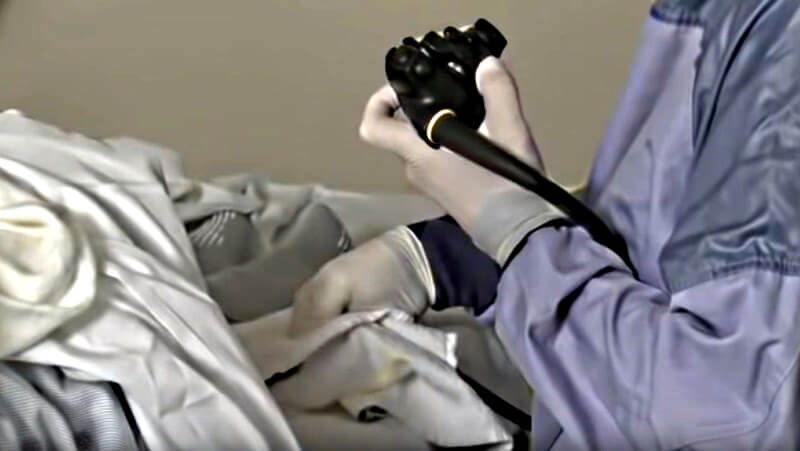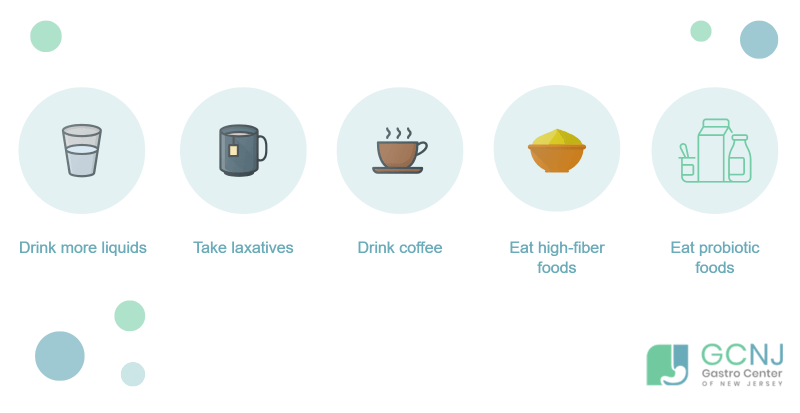A colonoscopy is a routine procedure performed to diagnose colorectal polyps. This screening method has been instrumental in diagnosing colon cancer in its early stages, as well as preventing growths from morphing into cancer altogether.
The first step to an accurate diagnosis is an effective bowel prep. However, some conditions may interfere with the bowel prep, most notable of which is chronic constipation.
Can you still have a colonoscopy if you are constipated? Yes, you can but some adjustments have to be made to ensure that your chronic constipation doesn’t interfere with the rest of the procedure.
In this article we discuss everything you need to know to have a successful colonoscopy, even if you’re constipated. Read on to learn about the science behind colonoscopy screenings and how to improve constipation before your colonoscopy.
How Is Constipation Diagnosed?
Constipation comes and goes and is characterized by infrequent, if not difficult, passing of the stools. Signs of constipation include:
- Difficulty passing stools or not passing stools altogether
- Feeling blockage in the rectum, preventing easier bowel movements
- Feeling “dry” stools that are difficult to pass
- Bloating and gassiness
- Not being relieved after passing a bowel movement
Constipation is often a result of dietary and lifestyle choices. Eating foods high in fat can affect stool consistency. Similarly, eating a high-fiber diet and eating less processed foods can regulate and improve your bowel movements. Drinking lots of liquids and staying active is also key in regulating bowel movements.
In some cases, constipation lasts more than a few weeks, even with dietary interventions. At this point, doctors will characterize your constipation as chronic and you’ll be subject to tests to understand the state of your gastrointestinal system.
Diagnosing constipation isn’t as straightforward as you think. According to the guidelines published by The American Society of Gastrointestinal Endoscopy, diagnosing constipation shouldn’t just be based on frequency but also other factors such as:
- Discomfort during the passing of bowels
- Passage of hard stools
- Whether a patient is straining excessively during a bowel movement
Colonoscopy and Constipation

Can Colonoscopies Treat Constipation?
It’s possible to undergo a colonoscopy while constipated. In fact, some doctors recommend colonoscopies precisely because a patient is constipated.
A colonoscopy is typically recommended if the patient is also experiencing the following symptoms:
- Rectal bleeding
- Weight loss
- Iron-deficiency anemia
- Rectal prolapse
- Signs of intestinal obstruction
- Severe abdominal pain
Chronic constipation could be a sign of bowel obstruction caused by colorectal polyps. As such, further investigation is required to understand if physical blockages are causing constipation. As a diagnostic tool, a colonoscopy can visually confirm if constipation is being caused by a physical obstruction.
However, the diagnostic benefits of undergoing colonoscopy because of constipation are limited. Researchers suggest that its diagnostic rates are similar to the case of an asymptomatic patient undergoing regular colon cancer screening. This means that constipation alone is not a good indicator that colorectal polyps are present in the colon.
For instance, a study involving 563 colonoscopies performed to evaluate constipation found the following results:
- Only 1.4% of the cases detected colon cancer
- 14.6% of the cases found adenomas or growths
- 4.3% found advanced lesions on the intestinal wall
Colonoscopy: Beneficial or Excessive?
That’s not to say that colonoscopies aren’t instrumental in handling constipation. In fact, a colonoscopy can still be recommended to guide long-term treatment plans for constipated patients. Doctors may choose to perform a colonoscopy to see how a patient is responding to modifications in diet and medication, and use these insights to further improve the patient’s quality of life.
Colon Cancer Screening with Constipation: Is It Possible?
In other instances, colonoscopy is performed to investigate symptoms other than constipation. In this case, patients might be experiencing temporary constipation and are worried about how this will affect the findings.
As mentioned, colonoscopy with constipation is still possible but extra precaution is advised to ensure proper preparations, especially when it comes to the bowel prep.
How Does Constipation Affect Bowel Preparation?
A study published in Frontline Gastroenterology illustrates how constipation can impact the effectivity of a bowel prep. While this may seem irrelevant now, keep in mind that a thorough bowel prep can actually be the difference between an effective colonoscopy and a failed one.
According to the researchers, an inefficient bowel prep can reduce polyp detection rate and increase the overall cost of colon cancer prevention. When done poorly, a bowel prep can prevent gastroenterologists from viewing the lower intestine as clearly as possible, resulting in compromised results or additional tests.
Recommended Colonoscopy Prep For Constipated Patients
Researchers found that different prep drinks can lead to varying prep results. Constipated patients that were asked to undergo colon cleansing using bisacodyl resulted in more satisfying rates of colon prep.
Although bisacodyl is usually associated with abdominal pain, patients who are already experiencing constipation did not experience worse abdominal pain compared to non-constipated patients. The study suggests that the use of NaP or sodium phosphate with bisacodyl is the best way to undergo a successful colon prep for constipated patients.
As a patient, you can ask your doctor to recommend stronger doses of bowel prep drinks, or find ones that have NaP and bisacodyl in the ingredients list. This will help ensure that your colon prep is thorough and successful.
How to Improve Constipation Before Colonoscopy

So you’re due for a colonoscopy but you’re also constipated. You can try to alleviate constipation two weeks before your colonoscopy in order to improve the results of your bowel prep. These at-home remedies can help regulate your bowel movement and take care of constipation for good:
1. Drink More Liquids
You’ve heard it before and you’ll hear it again. Dehydration can make bowel movements sluggish, accounting for dry and hard to pass stools. When you drink water, you’re increasing the water uptake in your bowels and can kickstart a more frequent bathroom schedule again.
2. Take Laxatives
Senna, an all-natural laxative, is widely used to treat constipation. It comes in many forms, including one in tea bags that you can drink and take whenever you need. Senna is a herbal laxative that stimulates bowel movements with no help from chemicals, although it’s not recommended for pregnant people or individuals with inflammatory bowel disease.
3. Drink Coffee
Coffee is a powerful diuretic but did you know it can make you go to the bathroom too? High amounts of caffeine can stimulate your gut muscles and improve your bowel movements. Just make sure you’re getting your caffeine supply from sources like tea or coffee instead of energy drinks.
4. Eat High-Fiber Foods
High-fiber foods are associated with better bowel movements because they improve the consistency of stool, making it easier to pass through the colon. Various studies even support that high-fiber meals can improve chronic constipation if it’s added to the patient’s long-term diet.
When you’re picking out fibers, make sure to stick with soluble fibers. These are often found in oat bran, beans, nuts, seeds, and lentils. Soluble fibers are primarily responsible for adding water to your stool, which improves its consistency. Unlike insoluble fibers, soluble fibers are easier to digest and won’t complicate other bowel problems such as irritable bowel syndrome.
5. Eat Probiotic Foods
Sometimes all it takes to become regular again is to enlist the aid of some good bacteria. Various studies affirm the benefit of adding probiotics to your diet, which is especially useful for individuals with functional bowel diseases.
Probiotics restore balance in the gut and help fight off bad bacteria from colonizing the colon. The presence of beneficial microbes can also aid in the digestion process, allowing for more frequent bowel movements and improved stool consistency.
Yogurt isn’t the only source of probiotics. You can incorporate fermented foods such as sauerkraut and kimchi to see a difference in your digestive system. You can also choose to take probiotic supplements, but these usually take a couple of weeks before showing significant improvements.
Post-Colonoscopy Constipation: What It Means & What to Do With It

A patient may experience constipation after a colonoscopy due to the extra air in the colon. Patients typically report feeling full, bloated, and having difficulty passing stools immediately after their colonoscopy. These symptoms are normal and should be no cause for worry. They typically disappear 3-4 days after the procedure.
In the meantime, we suggest eating smaller meals the day after your procedure to help your colon relax. Feel free to resume your normal meals when you have a more regular bathroom schedule again.
If your constipation gets worse 4+ days after your colonoscopy, accompanied by bleeding, vomiting, or fever, get in touch with your doctor immediately. You might be asked to undergo another colonoscopy to evaluate what is happening in your colon.
Colon Cancer Screening Made Easy
At Gastro Center NJ, we want to give you a comfortable colonoscopy experience. From start to finish, we’re dedicated to making sure our patients are informed, compliant, and in only in the best hands.
If you’re concerned about your colonoscopy prep, get in touch with us today and let’s find a solution together.
